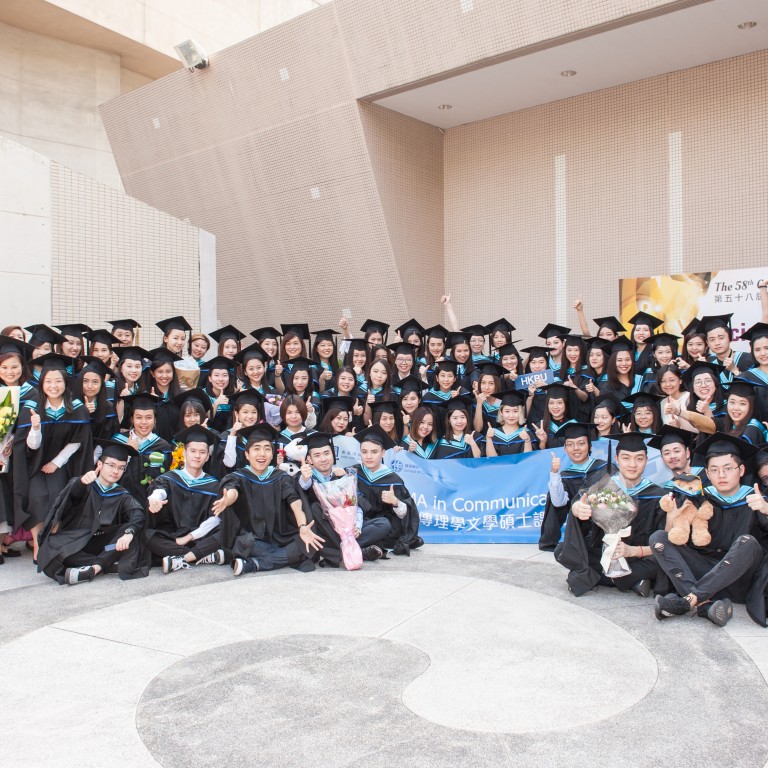
[Sponsored] Hong Kong Baptist University (School of Communication) Taught Postgraduate Programmes
Career prospects for Hong Kong Baptist University (HKBU) School of Communication’s postgraduates look promising
[Sponsored Article]
Driven by the proliferation of digital technologies and social media channels in many sectors, the career prospects for students taking taught postgraduate programmes at the Hong Kong Baptist University (HKBU) School of Communication look decidedly bright.
There are programmes in International Journalism, Media Management, Producing for Film, Television and New Media and Communication, opening up all sorts of possibilities in both well established and recently launched companies.
"Graduates from all the MA programmes the school offers encounter few difficulties securing good jobs,” says Professor Steve Guo, programme director for the MA in Communication. In general, he notes, demand for trained professionals is increasing and, with advances in electronics creating greater accessibility and immediacy, there is also an ever more diverse choice of roles.
For example, organisations of all types are concerned about how they engage with and are perceived by the public, and this brings a need for new skills and expertise.
“Therefore, education must meet the challenge by ensuring graduates are ready to help industry by using new technology and embracing change,” says Guo, adding that MA graduates of the School of Communicationcan go on to work for anything from a start-up to an NGO or a foreign consulate.

Typically, though, graduates of the MA in Communication tend to gravitate towards jobs in public relations, advertising, the news media, internet-related industries, government offices and education.
“Almost without exception, graduates who choose to stay in Hong Kong can find the type of work they are looking for, and many remain with the same employer for years,” Guo says.
Alternatively, some have opted to take second master’s degree or a PhD at universities in mainland China or elsewhere.
Now stretching back 20 years, the HKBU programme is taught by dedicated faculty members, supplemented by respected industry practitioners and international scholars. According to Guo, a key strength of the MA is its “mission critical” courses. These cover topics such as new media technology, cyberspace, and big data. There are also modules on research methods, journalism, advertising, and public relations.
The aim is to develop soft skills, like critical thinking, as well as the technical know-how to make use of tools for statistical analysis and data mining. These different aspects are integrated across all the various courses.
To give first-hand experience, guest speakers and industry leaders are invited to talk about their research, experience and careers.
“Students respond enthusiastically to this part of the programme,” Guo says.
There are also overseas study trips. These may be to observe political campaigns, different businesses and media practices or to participate in conferences, workshops and seminars.
The MA in Communication usually attracts first-degree holders working for media organisations or in PR in the public or private sector - and those hoping to break into these areas. The programme provides an in-depth understanding of professional practices and enhances executive leadership abilities. Applicants should be proficient in English.

As digital communication and social media channels evolve, the curriculum is regularly updated to reflect this.
“We constantly evaluate the courses to ensure students are equipped with the tools, skills and perspectives needed to advance their careers,” Guo says.
As a result, the school has taken on more full- and part-time faculty members who specialise in digital communication and can lead intensive workshops and cutting-edge seminars. Students can also pick certain courses with more of a focus on film, television and digital media.
Available since 2007, the school’s MA in International Journalism has helped hundreds of graduates go on to successful careers as reporters, editors or photographers with major news organisations. The programme, which puts particular emphasis on events in Hong Kong, the mainland and Southeast Asia, offers two concentrations: international journalism, and business and financial journalism.
In contrast, the MA in Producing for Film, Television and New Media trains students to work as executives in a sector seeing ever-increasing demand for co-productions between Hong Kong and companies in Greater China and beyond. Launched in 2013, the one-year MAFTNM programme is the first of its kind and offers comprehensive training in planning, financing, project development, producing, distribution, promotion, public relations, marketing and theatre management.
Jointly offered by the School of Communication and the School of Business, the MSocSc in Media Management aims to produce graduates with general business skills and the specialist knowledge needed to run media companies.
Also a first of its kind in the Greater China region, the three-year, full-time Master’s of Fine Arts in Film, Television and Digital Media leads on to careers as producers, directors, screenwriters, and other significant positions in the industry.
